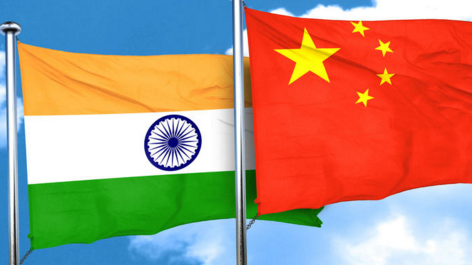
Editor's Note: Andrew Korybko is a Moscow-based American political analyst. The article reflects the author's views and not necessarily those of CGTN.
India illegally infringed the Line of Actual Control (LAC) separating its forces from China near the southern end of Pangong Lake over the weekend in a provocative move that risks sparking renewed tensions between the world's two most populous nations. This aggressive action came as a surprise since both sides were hitherto negotiating with one another to de-escalate the situation over the past few months following India's failed incursion in the Galwan River Valley.
On the surface, casual observers might think that this is all about territory, but it actually concerns much more than just that. The areas abutting the LAC between the Indian-occupied Kashmir region of Ladakh and China's Aksai Chin are scarcely populated and not thought to contain any valuable resources. It's true that both are strategically positioned to provide one or the other with an advantage in a theoretical military conflict, but India isn't just maneuvering its military forces in an attempt to gain an edge against China in such a dark scenario.
Most immediately, India seeks to achieve several domestic objectives, the first of which is to make a dramatic scene out of trying to restore its lost pride following this summer's Galwan Incident. At least twenty of its soldiers died during hand-to-hand combat after transgressing the LAC, which shocked the Indian masses since they had up until that point been fed a steady stream of exaggerated information over the years by their jingoist media claiming that their country was already a so-called "superpower," which it clearly isn't.
Prime Minister Narendra Modi of the ruling Hindu nationalist BJP derives a lot of his legitimacy from his campaign promise to improve India's prestige, which dramatically declined after the Galwan incident. He's under tremendous pressure by the influential military to "save face" before his people by staging another dangerous stunt with China that can then be spun by his media allies into "standing up" to the People's Republic. This extreme and misguided manifestation of nationalism is also intended to distract from two domestic crises.

The talks led by China's Southern Xinjiang Military District chief and India's 14 Corps commander held in the border area on the Chinese side, June 6, 2020. /Xinhua
The talks led by China's Southern Xinjiang Military District chief and India's 14 Corps commander held in the border area on the Chinese side, June 6, 2020. /Xinhua
The most pressing of these is COVID-19 after India reported the world's highest-ever daily count of cases on August 30, Sunday, at over 78,000, surpassing even the United States. The situation is extremely dire in this densely populated nation which has always struggled with ensuring proper sanitary conditions. It's unable to properly treat its people, and many of them are nowadays beginning to wonder whether the government even cares about them. This is especially so since the economy is contracting at the astonishing pace of 24 percent.
The resultant crisis of legitimacy that's hounding Prime Minister Modi at the moment appears to have placed him further under the United States' hegemonic influence as he desperately seeks a so-called "pressure valve." He mistakenly seems to believe that provoking another security incident with China will assure India of American support. In particular, New Delhi expects to receive more medical assistance in combating COVID-19, promises of investment for saving its economy, and the false perception of "prestige" by "containing" China on its behalf.
The U.S., after all, was very loud in its diplomatic support of India after this summer's Galwan incident, but it didn't provide any tangible assistance to what Trump boasted as America's new "comprehensive global strategic partner" in February during his visit there. No impressive amounts of medical aid were sent, no serious investment pledges were made, nor was any military support forthcoming. It was all just rhetoric playing to the wishful thinking expectations of India's jingoist leadership to mislead them into carrying out more provocations.
India is making the greatest mistake of its post-independence history in thinking that it can regularly provoke security issues with China as the "new normal" in their bilateral relations. This dangerous strategy won't help resolve India's domestic crises, but only worsen them. Functioning, whether consciously or not, as the United States' wedge for dividing and ruling Asia in the 21st century is bound to fail. The People's Republic of China isn't a pushover and won't be bullied. India must therefore immediately cease its hostile actions and resume talks with China.
(If you want to contribute and have specific expertise, please contact us at opinions@cgtn.com.)